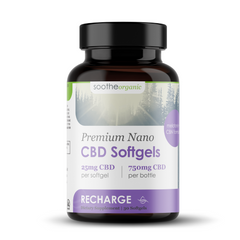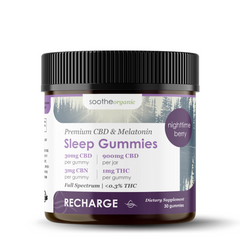Ever wondered why a little drop of CBD oil can make such a big difference in how you feel? Or why your body seems to have its own built-in chill-out mechanism? Buckle up, because we're diving headfirst into the fascinating world of the endocannabinoid system (ECS)—that unsung hero lurking in your body, quietly keeping everything in balance. Discovered relatively recently through studies on cannabis and hemp, the ECS is like the body's secret traffic cop, directing signals to maintain harmony amid life's chaos. Think of it as your internal zen master, regulating everything from mood swings to munchies, and even stepping in to ease those nagging aches.
This article is your fun, fact-packed guide to unlocking the mysteries of the ECS. We'll explore how endocannabinoids (your body's natural chill pills), cannabinoid receptors, and plant-based cannabinoids from hemp work together. Whether you're curious about using CBD oil for PTSD or exploring CBD for joint and muscle pain, understanding the ECS could be the key to unlocking natural wellness. And hey, at Soothe Organic, we're all about harnessing this system with high-quality, organic products like our full spectrum CBD tincture and organic sleep gummies. But more on that later—let's get sciency (but keep it light)!
Key Takeaways
- The endocannabinoid system is your body's master regulator, maintaining balance (homeostasis) across internal systems like mood, sleep, and pain response.
- Endocannabinoids are produced naturally by your body, but you can give them a boost with hemp-derived supplements, such as CBD for joint pain or our soothing organic sleep gummies.
- THC and CBD are the stars of the cannabinoid show in hemp plants; while THC gets you high, CBD offers non-intoxicating benefits, making it a go-to for many seeking relief without the buzz.
- Always do your homework on CBD products—forms like tinctures, creams, and edibles vary in effectiveness—and chat with your doctor to dodge any medication mix-ups.
- Research is booming, showing potential for the ECS in everything from inflammation to mental health, but remember, it's not a magic cure-all—science is still catching up!
What is the Endocannabinoid System?
Picture this: Back in the 1990s, scientists were poking around cannabis plants, trying to figure out why THC makes you feel "elevated." What they stumbled upon was a whole new bodily system—the endocannabinoid system—that's been hiding in plain sight all along. It's not just about getting high; the ECS is a crucial network influencing your mental state, physical balance, and overall vibe.
At its core, the ECS consists of endocannabinoids (like anandamide, dubbed the "bliss molecule," and 2-AG), which your body whips up on demand. There are over 113 known cannabinoids in hemp, but your body makes its own versions to bind with CB1 and CB2 receptors scattered throughout your brain, nerves, immune cells, and even bones. CB1 receptors are mostly in the brain, handling things like mood and appetite, while CB2 hangs out in the immune system, tackling inflammation and pain.
This system is a big deal for homeostasis—that fancy word for keeping your body stable despite stress, injury, or that extra slice of pizza. Studies show the ECS is involved in pain management, reducing inflammation, and supporting immune function. It's even linked to mental health, regulating the endocrine and nervous systems to help with anxiety or PTSD symptoms. Imagine the ECS as your body's thermostat: too hot (inflammation)? It cools things down. Too cold (low mood)? It warms you up.
Understanding this can open doors to therapeutic uses of hemp products. For instance, CBD oil for PTSD has shown promise in preclinical studies by modulating fear responses and promoting calm. Similarly, for those dealing with aches, CBD for joint pain could interact with ECS receptors to ease discomfort without the harsh side effects of traditional meds.

Mechanism and Function
Alright, let's geek out on how this system actually works—without putting you to sleep (that's what our organic sleep gummies are for!). The ECS operates like a lock-and-key setup: endocannabinoids are the keys, cannabinoid receptors are the locks, and when they connect, magic happens—communication between cells ramps up, regulating processes like pain, mood, and immunity.
Here's the fun breakdown:
- Pain and Inflammation Control: Endocannabinoids bind to receptors to dial down pain signals and inflammation. This is why CBD cream for pain relief is gaining fans—topical application targets sore spots directly, potentially reducing joint and muscle pain. Research on arthritis models shows CBD can cut pain by 44% in some cases!
- Homeostasis Hero: The ECS keeps your internal environment steady, responding to stress or injury. It's like your body's built-in yoga instructor, promoting relaxation and recovery.
- Disease Fighter: Imbalances in the ECS are linked to conditions like epilepsy, MS, and chronic pain. Targeting it with full spectrum CBD (which includes a symphony of cannabinoids for the "entourage effect") might offer new treatments. Full spectrum vs. broad spectrum? Full includes trace THC for enhanced benefits, without the high.
By tweaking the ECS, researchers are eyeing breakthroughs for tough diseases. For example, in cancer biology, the ECS influences cell growth and immune responses. And in neurodegenerative disorders like Alzheimer's, maintaining ECS balance could slow progression.
Supplementation and Safety
Ready to level up your ECS? Supplementation with hemp-derived CBD can be a game-changer, but let's keep it safe and smart. At Soothe Organic, we craft products like our full spectrum CBD tincture—packed with all the good stuff from hemp—to support your body's natural balance. Imagine dropping a few under your tongue for quick absorption, potentially aiding with CBD for joint and muscle pain or even winding down for bed.
CBD shows promise in relieving discomfort, supporting healthy inflammation responses, and improving sleep—though, full disclosure, these aren't FDA-approved claims yet. Forms matter: Tinctures for fast action, softgels for convenience, topical creams (like our organic CBD salve) for targeted relief, and edibles like organic sleep gummies for a tasty nighttime ritual.
But here's the authoritative nudge: Always consult a healthcare pro before starting, especially if you're on meds—CBD can interact with things like blood thinners. The FDA doesn't regulate CBD, so stick to trusted brands like ours, third-party tested for purity. Start low with serving sizes, monitor effects, and adjust based on your needs.
Safety first: While CBD is generally well-tolerated, side effects like dry mouth or drowsiness can occur. No worries about addiction—unlike THC, CBD doesn't create dependence.

Frequently Asked Questions
Can a deficiency in the endocannabinoid system be responsible for certain medical conditions?
Oh, absolutely—this is where things get intriguing! Clinical Endocannabinoid Deficiency (CED) is a theory linking low ECS activity to issues like migraines, fibromyalgia, and IBS. When the system falters, homeostasis suffers, potentially leading to chronic pain or mood disorders. Supplementing with cannabinoids like CBD might help restore balance, alleviating symptoms—think CBD oil for PTSD to calm hyperactive fear responses. But more research is needed; it's not a one-size-fits-all fix.
Are there any negative side effects associated with using CBD or other hemp-based products?
Like any supplement, CBD isn't side-effect-free, but they're usually mild. Studies report dry mouth, diarrhea, dizziness, or appetite changes. It can interact with meds, so doctor chats are key. Long-term? Limited data, but no major red flags for most users. Approach with evidence-based caution—our full spectrum CBD tincture is designed for safety, but listen to your body.
Is it possible for the body to become dependent on CBD or other hemp-based products?
Good news: Nope! CBD lacks the addictive punch of THC or opioids. In fact, it might even help with addiction recovery. Studies show no "high" or withdrawal risks, making it a safe daily ally for pain or sleep. Still, consult pros if you're swapping habits.
How does the endocannabinoid system interact with other bodily systems, such as the immune system?
The ECS is a social butterfly! It chats with the immune system via CB2 receptors on immune cells, modulating inflammation and responses. Activation can calm overactive immunity (hello, autoimmunity) or boost it against threats. Endocannabinoids like anandamide fine-tune this, and plant cannabinoids (THC, CBD) join the party. In the nervous system, it influences mood and pain; in the endocrine, hormone balance. Further studies reveal ties to gut health and beyond.
Are there any legal restrictions on the use of CBD or other hemp-based products in certain countries or states?
Legality is a patchwork quilt! In the US, the 2018 Farm Bill legalized hemp-derived CBD federally (under 0.3% THC), but states vary—some embrace it, others restrict. Globally? Europe often allows 0.2% THC max; places like Canada are chill with both CBD and THC. But countries like Singapore ban it outright. Research your locale—Soothe Organic ships where legal, but always check laws.
There you have it—your ECS unlocked! This system's potential is massive, from easing CBD for joint pain with creams to supporting rest with organic sleep gummies. At Soothe Organic, we're passionate about organic, science-backed wellness. Dive deeper, stay curious, and here's to your balanced life.
Nano CBD softgels,full spectrum, CBD softgels, broad spectrum CBD softgels, green spectrum CBD gummies, CBD energy drinks, CBD mocktails, CBD for muscle recovery, CBD for better sleep, is CBD legal in wyoming, best CBD casper, CBD gummies casper, THCv gummies casper, CBD tinctures wyoming, delta 9 gummies wyoming, best CBD softgels Wyoming, CBD oil Casper Wyoming, Casper CBD store, CBD gummies Casper, CBD tinctures Casper, Hemp-derived CBD Casper, CBD products in Casper, Best CBD shop Casper, CBD capsules Casper Wyoming
Casper CBD hemp products






